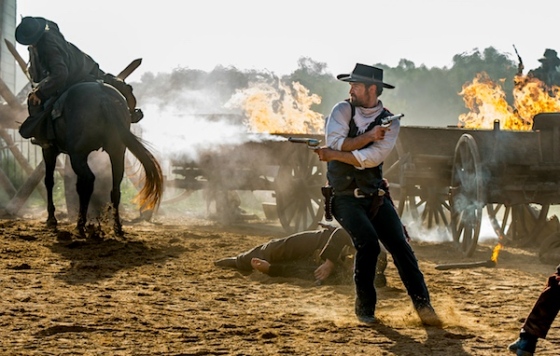Antoine Fuqua | 133 mins | Blu-ray | 2.39:1 | USA / English | 12 / PG-13

Despite sharing a title and setting, this second Western remake of Akira Kurosawa’s Seven Samurai is almost as different from The Magnificent Seven (1960 version) as that was from the original. Maybe that’s over-egging the point, but The Magnificent Seven (2016 version) is certainly not just a straight-up do-over of the popular Western classic.
The broad sweep of the plot is the same: a small town is being terrorised by a local big-man and his gang, so they hire a septet of down-on-their-luck warriors to defend them. Here, said town has been relocated to America (from Mexico in the ‘original’), and the characterisations of the seven gunslingers have been struck afresh rather than recreated, albeit with some near-unavoidable similarities to the previous seven.
What you want to see in the film affects whether these changes are sizeable or not. As I said, the basic shape of the plot remains untouched, with the defenders recruited one by one, training up the townsfolk, and then engaging in a lengthy climactic battle when the bad guys return to town. So at a story level it works as well as this tale ever has, with the same pros and cons for its characters: with so many principals some get shortchanged on screen time, but they’re a mostly likeable bunch. In the lead roles, Denzel Washington, Chris Pratt, and Ethan Hawke are decent modern stand-ins for Yul Brynner, Steve McQueen, and Robert Vaughn (respectively, more or less), though of course that varies depending on your personal like or otherwise for the actors in question.

Looking to the combat, the film is again similar but modernised. The action scenes are slick, well choreographed and littered with dead bodies and big explosions, rather than the slightly off-the-cuff style of older action films. Framing it as a few-against-many last-stand skirmish, the film constructs the finale as a battle with strategies and tactics, ebb and flow, rather than an everybody-run-at-everybody-else free-for-all. That seems to be the way movies are going with their depiction of large-scale conflict, and I think that’s a good thing.
Where the remake’s changes have most impact is if you want to consider the film politically. The town in need of defending has been switched from a Mexican village to an American outpost, a symbol of good honest hard-working folk trying to establish a life for themselves. The villains terrorising them have been switched from a Mexican criminal gang to a power-hungry businessman, with a group of heavies and the local sheriff in his pocket. The seven encompass a greater deal of racial diversity: a black leader, a Mexican fugitive, an Asian knife-thrower, a Native American archer… The other three are white guys, but that doesn’t negate the point. In our modern political climate — particularly in the US — there’s a lot of different stuff to unpack there.

I’m not sure the issues in question really need spelling out, so I’m slightly more curious how much of it was intentional on the part of the filmmakers, and how much an incidental side effect of changes they made just to differentiate the film from the 1960 version. Frankly, I don’t think the movie is interested in making any big political points — you can’t reasonably deny those readings are there, but it’s all subtext (whether intentional or, I think more probably, accidental) to be analysed by those who are interested. I think director Antoine Fuqua and co were more concerned with creating an entertaining action movie than a political tract, and I think they’ve achieved that.
Judged as such, The Magnificent Seven probably isn’t at the forefront of its form, but it’s mostly a rollicking good time. And, as if to cement what I was writing recently about my preferences generally erring towards modern cinema, I actually enjoyed it more than the 1960 one.

The Magnificent Seven is available on Netflix UK from today.

Good review! I liked that the diverse cast was not the focus of the story, just a thing that happened. And I found this movie to be a lot of fun!
LikeLiked by 1 person
Yeah, one of the advantages of the film not directly engaging with issues it kicks up is it makes things like a diverse cast just feel natural, which is more powerful. It allows it to remain fun too, which is important when that’s what it’s trying (and, I agree, succeeding) to be.
LikeLike
Must have missed Steve Martin in the 1960 version…
LikeLike
Ha, not sure how that happened! Fixed.
LikeLike